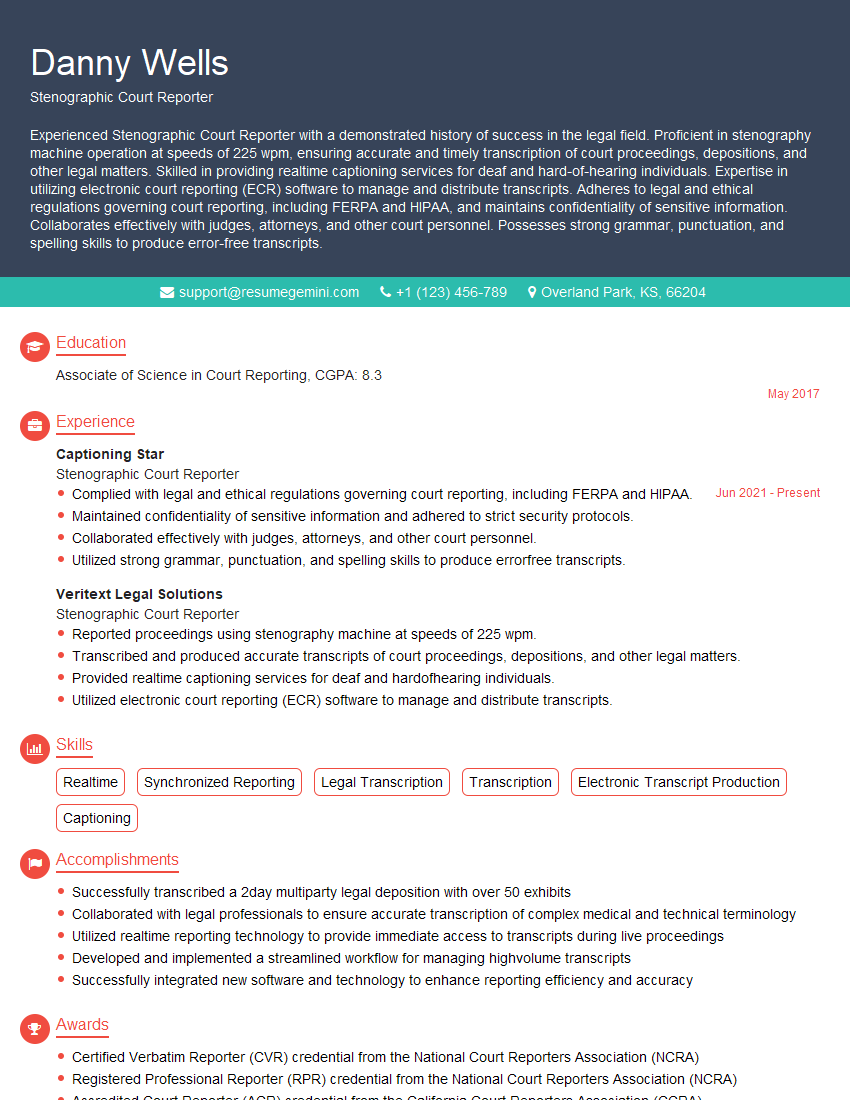Are you a seasoned Stenographic Court Reporter seeking a new career path? Discover our professionally built Stenographic Court Reporter Resume Template. This time-saving tool provides a solid foundation for your job search. Simply click “Edit Resume” to customize it with your unique experiences and achievements. Customize fonts and colors to match your personal style and increase your chances of landing your dream job. Explore more Resume Templates for additional options.

Danny Wells
Stenographic Court Reporter
Summary
Experienced Stenographic Court Reporter with a demonstrated history of success in the legal field. Proficient in stenography machine operation at speeds of 225 wpm, ensuring accurate and timely transcription of court proceedings, depositions, and other legal matters. Skilled in providing realtime captioning services for deaf and hard-of-hearing individuals. Expertise in utilizing electronic court reporting (ECR) software to manage and distribute transcripts. Adheres to legal and ethical regulations governing court reporting, including FERPA and HIPAA, and maintains confidentiality of sensitive information. Collaborates effectively with judges, attorneys, and other court personnel. Possesses strong grammar, punctuation, and spelling skills to produce error-free transcripts.
Education
Associate of Science in Court Reporting
May 2017
Skills
- Realtime
- Synchronized Reporting
- Legal Transcription
- Transcription
- Electronic Transcript Production
- Captioning
Work Experience
Stenographic Court Reporter
- Complied with legal and ethical regulations governing court reporting, including FERPA and HIPAA.
- Maintained confidentiality of sensitive information and adhered to strict security protocols.
- Collaborated effectively with judges, attorneys, and other court personnel.
- Utilized strong grammar, punctuation, and spelling skills to produce errorfree transcripts.
Stenographic Court Reporter
- Reported proceedings using stenography machine at speeds of 225 wpm.
- Transcribed and produced accurate transcripts of court proceedings, depositions, and other legal matters.
- Provided realtime captioning services for deaf and hardofhearing individuals.
- Utilized electronic court reporting (ECR) software to manage and distribute transcripts.
Accomplishments
- Successfully transcribed a 2day multiparty legal deposition with over 50 exhibits
- Collaborated with legal professionals to ensure accurate transcription of complex medical and technical terminology
- Utilized realtime reporting technology to provide immediate access to transcripts during live proceedings
- Developed and implemented a streamlined workflow for managing highvolume transcripts
- Successfully integrated new software and technology to enhance reporting efficiency and accuracy
Awards
- Certified Verbatim Reporter (CVR) credential from the National Court Reporters Association (NCRA)
- Registered Professional Reporter (RPR) credential from the National Court Reporters Association (NCRA)
- Accredited Court Reporter (ACR) credential from the California Court Reporters Association (CCRA)
- Certified Court Reporter (CCR) credential from the Kentucky Court Reporters Association (KCRA)
Certificates
- NCRA Registered Professional Reporter (RPR)
- Certified Realtime Reporter (CRR)
- Certified Shorthand Reporter (CSR)
- Certified Verbatim Reporter (CVR)
Career Expert Tips:
- Select the ideal resume template to showcase your professional experience effectively.
- Master the art of resume writing to highlight your unique qualifications and achievements.
- Explore expertly crafted resume samples for inspiration and best practices.
- Build your best resume for free this new year with ResumeGemini. Enjoy exclusive discounts on ATS optimized resume templates.
How To Write Resume For Stenographic Court Reporter
- Showcase your exceptional stenography skills and accuracy.
- Highlight your experience in providing realtime captioning services.
- Emphasize your proficiency in electronic court reporting (ECR) software.
- Demonstrate your understanding of legal and ethical regulations governing court reporting.
- Include relevant certifications and professional development activities.
Essential Experience Highlights for a Strong Stenographic Court Reporter Resume
- Reported court proceedings verbatim using stenography machine at speeds of 225 wpm.
- Transcribed and produced accurate transcripts of court proceedings, depositions, and other legal matters.
- Provided realtime captioning services for deaf and hard-of-hearing individuals.
- Utilized electronic court reporting (ECR) software to manage and distribute transcripts.
- Complied with legal and ethical regulations governing court reporting, including FERPA and HIPAA.
- Collaborated with judges, attorneys, and other court personnel to ensure accurate and efficient reporting.
- Maintained up-to-date knowledge of court reporting best practices and technologies.
Frequently Asked Questions (FAQ’s) For Stenographic Court Reporter
What is the role of a Stenographic Court Reporter?
A Stenographic Court Reporter is responsible for creating a verbatim record of legal proceedings, including trials, depositions, and hearings. They use stenography machines to capture the spoken word and produce accurate transcripts.
What skills are required to be a Stenographic Court Reporter?
Essential skills include exceptional stenography skills, proficiency in electronic court reporting (ECR) software, strong grammar and punctuation, and the ability to maintain confidentiality.
What is the career outlook for Stenographic Court Reporters?
The job outlook for Stenographic Court Reporters is expected to grow faster than average in the coming years due to the increasing demand for accurate and timely transcripts in legal proceedings.
What is the salary range for Stenographic Court Reporters?
The salary range for Stenographic Court Reporters varies depending on experience, location, and employer. According to the U.S. Bureau of Labor Statistics, the median annual salary for Court Reporters was $61,780 in May 2021.
What are the educational requirements for Stenographic Court Reporters?
Most Stenographic Court Reporters have an associate’s degree in court reporting or a related field. Some states may require additional certification or licensing.
What is the difference between a Stenographic Court Reporter and a Transcriptionist?
Stenographic Court Reporters use specialized machines to capture the spoken word in real-time, while Transcriptionists typically work with audio or video recordings to create transcripts.
What are the benefits of using a Stenographic Court Reporter?
Benefits include the creation of a verbatim record, which is essential for legal proceedings; the ability to provide realtime transcripts for deaf and hard-of-hearing individuals; and the efficiency and accuracy of stenography machines.
What are the challenges of being a Stenographic Court Reporter?
Challenges include the need for exceptional stenography skills, the ability to work under pressure, and the potential for long hours and irregular schedules.